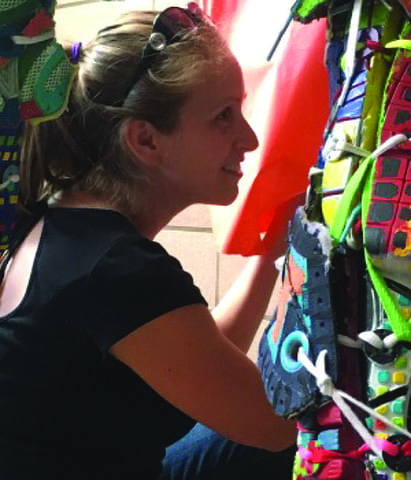Stomping out the stigma, the Jana Marie Foundation is dedicated to spreading mental health awareness through the creative expression of art.
From concerts to open-dialogue events, the foundation is one of the leading resources in Centre County for mental health support.
One of the foundation’s most visible programs is the Mokita Dialogues, which highlight often unspoken topics of vital interest to the community. This year’s sessions will be held at noon in a new location: 3 Dots Downtown in State College. Dates and topics include:
January 23 – Sense of Community
February 27 – Exploring Intolerance
March 26 – Women’s Rights
April 23 – Mental Health
May 28 – Bullying and Social Media
June 25 – Living Green
July 23 – Disability
August 27 – Political Climate
September 24 – Suicide
October 22 – Greek Life
November 19 – Gun Sense and Safety
December 10 – Alcohol Use and Abuse
Town&Gown spoke with Marisa Vicere, president and founder of the Jana Marie Foundation, about the journey of the foundation and the Mokita Dialogues program.
T&G: How was the Jana Marie Foundation founded?
Vicere: The Jana Marie Foundation began in 2012 shortly after my sister Jana died by suicide at the age of 30. I wanted to do something that ended the silence that often surrounds mental and emotional health with the purpose of making it known that it is OK to reach out for help and to reach to help someone. Prior to starting the organization, I researched the available resources here in the county and confirmed the need. Jana Marie Foundation [aims] to harness the power of creative expression and dialogue to spark conversations, build connections, and promote mental well-being among young people and their communities.
T&G: What inspired you to start the Mokita Dialogues program?
Vicere: Mokita Dialogues began with the desire to spark community-wide conversations. The word mokita comes from the Kivila language spoken near Papua, New Guinea, and means a known truth left unspoken – think of it as the elephant in the room. By providing safe spaces to explore these topics, we can connect, learn, grow, and work to find common ground and ways we can take action to ensure that everyone in this community feels accepted, appreciated, and understood.
T&G: Tell us more about the program?
Vicere: Held the fourth Thursday of every month (except November and December, when the sessions will occur on different dates because of the holidays) at 3 Dots, these brown-bag discussions not only highlight topics of vital interest – elephants in the room – but provides opportunities for follow-up and action. Each Mokita Dialogue session, led by a different facilitator from the community, includes a brief presentation, engaging activities that encourage thought and conversation, and suggestions for ways to continue the discussion. Join us to learn, to listen, and to be engaged in finding solutions for these important issues. It is time to come together to acknowledge the “elephants” that exist across our community and how we can address them.
T&G: How are the topics for the programs decided each month and year?
Vicere: We have a committee comprised of a wonderful, diverse group of individuals who comes together monthly to brainstorm creative and innovative ways to grow the program as well as to determine the themes.
T&G: What are the goals for the upcoming year?
Vicere: 2020 will be a great year! We have lots of new topics and are working on finding neutral facilitators and community activators as we speak. The lineup will continue to draw attention to the importance of mental wellness and will look at some topics that we as a community continue to shy away from. Our goal continues to make sure everyone has a voice and that we have safe spaces in our community to discuss topics that affect us all.
T&G: In your years of being a part of the discussions, what have been the most impactful moments?
Vicere: Some of the most memorable experiences have to do with the connections that are formed during the discussions. For example, we hosted a dialogue on immigration that was lively and powerful. Following the discussion, a large group of participants that have never met previously went to lunch to continue the conversation and to find ways they could help.
When we bring diverse groups of individuals together, we can sometimes hear more about the reality of the topic and identify potential gaps we might not have otherwise. This allows nonprofits, organizations, and community members the chance to explore several viewpoints and to brainstorm creative ways to approach the topic.
T&G: What do you hope people take away from the dialogues?
Vicere: That there is hope and there is help. We live in an amazing community full of resources and individuals who work hard every day to make this a town we can all thrive in. Through highlighting community activators, Mokita Dialogues helps to demonstrate some of the resources that are available in our community and helps to make connections for organizations to work together. Most importantly, we want to remind people they are not alone.
To learn more, visit janamariefoundation.org.



